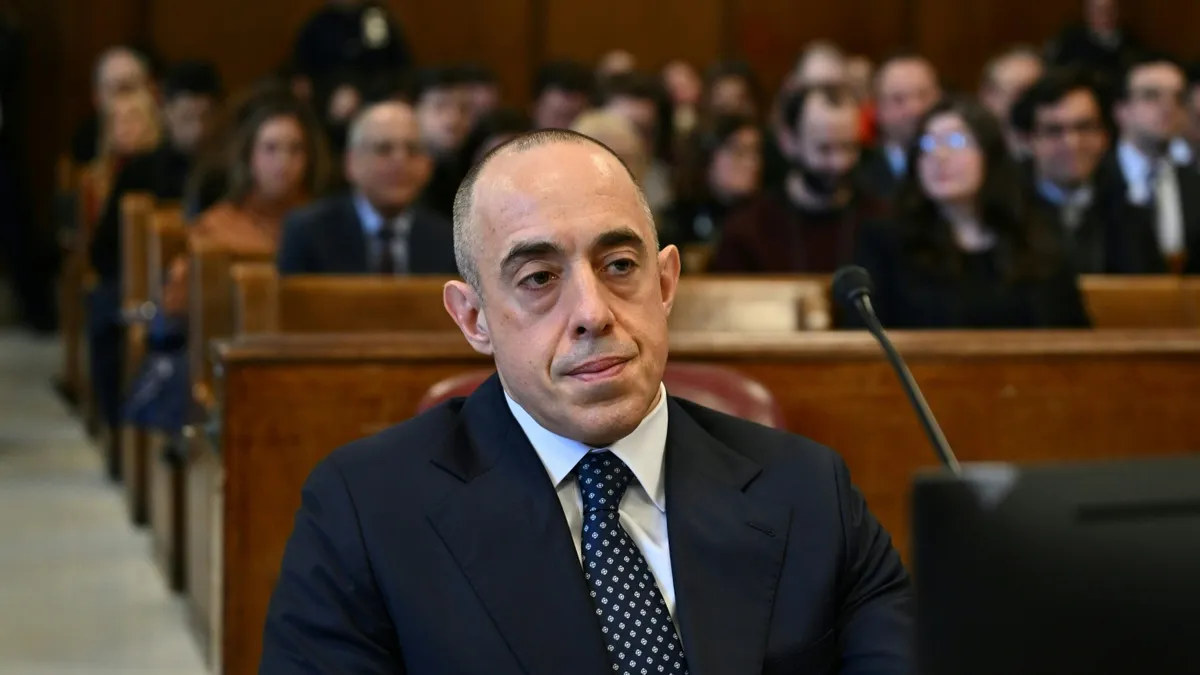
The White House has labeled Emil Bove as an exemplary nominee for a position on the federal courts, but this characterization raises significant concerns among his critics. Bove's career includes a substantial tenure as a federal prosecutor, where he accumulated numerous convictions but also faced several complaints regarding his performance. His trajectory took a notable turn when he transitioned to defending former President Donald Trump amidst four criminal indictments. Recently, Bove has played a pivotal role in some of the most contentious actions taken by the current administration within the Justice Department.
As the primary official overseeing daily operations at the Justice Department, Bove has been implicated in the dismissal of prosecutors and FBI agents involved in investigations targeting Trump and the January 6 Capitol riot. In a particularly controversial decision, he withdrew from a corruption case against New York City Mayor Eric Adams. Now, with Bove nominated by Trump to serve on the U.S. Court of Appeals for the Third Circuit, which includes Pennsylvania, New Jersey, Delaware, and the Virgin Islands, his upcoming confirmation hearing before the Senate Judiciary Committee presents an opportunity for Senate Democrats to scrutinize his actions during a tumultuous year at the Justice Department.
Critics argue that Bove's background as a staunch defender of Trump disqualifies him from a lifetime federal judgeship. Gregg Nunziata, a former chief nominations counsel for Republican lawmakers, expressed deep reservations about Bove's suitability for the position. He noted that Bove's nomination could signify a troubling trend of rewarding loyalty over merit within the judiciary. If confirmed, Bove, at 44 years old, would secure a role with considerable autonomy and lifetime tenure on the bench.
Despite the criticisms, the White House views Bove as a valuable addition to the judiciary. Harrison Fields, a White House spokesman, commended Bove's legal expertise, asserting that he is well-suited to fulfill the role of a circuit court judge. Fields emphasized that the President is dedicated to appointing constitutionalists to the judiciary, aiming to restore law and order while eliminating the perceived politicization of the justice system. However, Bove's nomination has also sparked a flurry of critical letters from Democratic senators.
Just a day before his confirmation hearing, a whistleblower filed a formal complaint against Bove, alleging that he intended to deliberately defy court orders and withhold vital information from judges regarding the administration's deportation agenda. This allegation adds another layer of complexity to Bove's nomination and raises serious questions about his judgment and ethics.
During Trump's first term, his administration confirmed over 200 federal judges, collaborating closely with Mitch McConnell and the Federalist Society. However, Trump has since had contentious interactions with judges who have obstructed his agenda, particularly concerning immigration and workforce reforms. Bove's relationship with the Federalist Society is noteworthy; he is not a member, which distinguishes him from many of Trump's previous nominees. The rising tensions between Trump and the Federalist Society's leadership, particularly Leonard Leo, suggest a shift in Trump's judicial appointment strategy.
Legal experts like Mike Davis, a former clerk to Supreme Court Justice Neil Gorsuch, have urged Trump to make bolder judicial appointments. Davis criticized the selection of moderate judges, arguing for a return to appointing individuals who prioritize constitutional fidelity over personal relationships or societal pressures. Conversely, Leo has lauded Trump's transformative impact on the federal courts, highlighting the judiciary as a cornerstone of the President's legacy.
Emil Bove boasts an impressive legal background, having graduated from Georgetown University Law Center and clerked for two federal judges appointed by President George W. Bush. His experience as a federal prosecutor in Manhattan includes high-profile cases against international figures such as Nicolas Maduro and Cesar Sayoc, who was implicated in sending explosive devices to prominent Democrats. However, Bove's prosecutorial tenure was not without controversy, as he faced allegations of misconduct that led to the abandonment of a conviction in a sanctions case.
Several complaints have emerged regarding Bove's conduct during his time at the U.S. Attorney's Office for the Southern District of New York (SDNY). A letter from the head of federal public defenders described Bove's behavior as reckless, likening him to a "prosecutor version of a drunk driver." Seven Senate Democrats have voiced concerns over a pattern of potentially unethical behavior and have requested documentation related to Bove's employment history at SDNY, emphasizing the significance of ethical standards for a federal judgeship.
While Senate Democrats are rallying against Bove's nomination, the Republican-controlled Senate may still confirm him if party members unite in support. The President's nominees require only a simple majority vote for confirmation. The unfolding events surrounding Bove's nomination could have lasting implications for the future trajectory of the U.S. judiciary.
Recent whistleblower accounts have painted a troubling picture of Bove's actions within the Justice Department, particularly regarding deportation policies. Reports indicate that Bove urged colleagues to proceed with deportations despite potential court orders, creating a rift between the Justice Department's stated policies and actual practices. His controversial decisions, including the dismissal of the corruption case against Eric Adams, have prompted backlash from both legal experts and lawmakers, raising serious ethical questions about his qualifications for the role of federal judge.
The nomination of Emil Bove to the U.S. Court of Appeals presents a complex interplay of legal expertise, political loyalty, and ethical scrutiny. As Bove prepares for his Senate confirmation hearing, the implications of his potential appointment reverberate through the legal community, challenging perceptions of judicial integrity and the role of loyalty in judicial nominations.